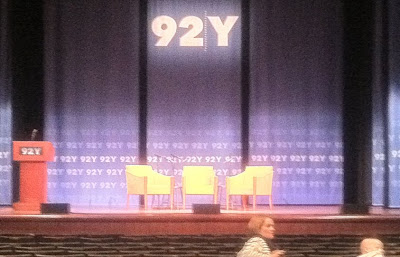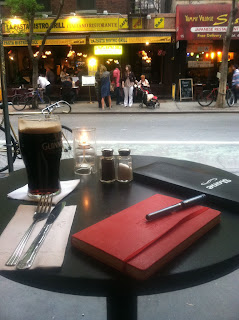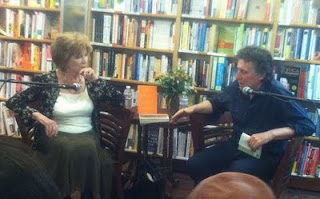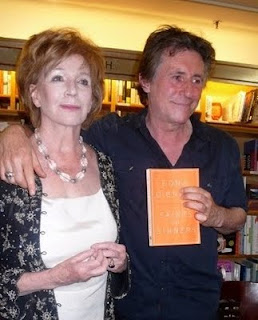Photos from my Flickr photostream.

Photos from my Flickr photostream.
A documentary aired on television earlier tonight about the legendary Chrysler Building here in New York. It brought to mind the incredible sets of Spider Man: Turn Off The Dark. Apparently the famous landmark features prominently in the musical’s scenic design, by George Tsypin.
It’s that inexplicable thing when you get a great performer and great material, and it can only happen in a live context. We were intrigued by it, and we’d seen some great shows like Les Miz and some of Andrew Lloyd Webber’s shows. We saw the chance to do something where we could take advantage of what we were playing around with in rock ‘n roll, and if it was the right project, it might be something we’d want to do.
I pondered this as I sat through the nearly-90 minute Q&A session, which was equal parts frustration (far too much uncritical fan worship) and fascination (body language indicating extreme nervousness for at least one of the composers), peppered with plenty of charm, sarcasm, and humor. The interview was a mix of casual and formal, focusing on U2’s creative output, and its connection with the experience of writing and producing on Broadway. Inane questions about “who do you think the next Gandhi will be?” aside (a fan question submitted earlier), it was, for the most part, an interesting mix of honesty, humor, and humility, offering a rare insight into the harried journey of composition and creativity from two very, very famous men.
 Lastnight, Bono admitted that the show still has “10%” left to improve on, and won’t close that gap for at least another two months. “In the end, The Edge and I have got good manners, we’re fun… but we are motherf***ckers,” he noted. There was steel in the singer’s husky voice, a characteristically Dublin-esque stare-down in his no-nonsense expression, devoid of usual charm, but with a bald, toothsome authenticity that made the comment -and its delivery -deeply affecting and entirely believable. That simple, blunt acknowledgement captured the sexy, succulent siren’s call of play and creativity, and her fraught relationship with the ugly, gargoyle-like nose-to-the-grindstone practicality that could only (and must only) be Lady Siren’s lifelong mate. What results is frequently personal, but when you’re in the performing arts, it winds up being writ large, up for debate, criticism, hounding, and eternal judgment. Such is the fate of such a union, of such a scary, scintillating, and in many ways, artistically necessary undertaking. A near-alchemical mix of faith and hard work sometimes open doors to new worlds -and sometimes not.
Lastnight, Bono admitted that the show still has “10%” left to improve on, and won’t close that gap for at least another two months. “In the end, The Edge and I have got good manners, we’re fun… but we are motherf***ckers,” he noted. There was steel in the singer’s husky voice, a characteristically Dublin-esque stare-down in his no-nonsense expression, devoid of usual charm, but with a bald, toothsome authenticity that made the comment -and its delivery -deeply affecting and entirely believable. That simple, blunt acknowledgement captured the sexy, succulent siren’s call of play and creativity, and her fraught relationship with the ugly, gargoyle-like nose-to-the-grindstone practicality that could only (and must only) be Lady Siren’s lifelong mate. What results is frequently personal, but when you’re in the performing arts, it winds up being writ large, up for debate, criticism, hounding, and eternal judgment. Such is the fate of such a union, of such a scary, scintillating, and in many ways, artistically necessary undertaking. A near-alchemical mix of faith and hard work sometimes open doors to new worlds -and sometimes not.92nd Street Y stage photo from my Flickr photostream.
 This concept manifest into a hard reality after I left the talk, as news came about a potential job having fallen through. Encouragements aside (and I do thank every one of you who’ve sent them), it was, and remains hugely, painfully disappointing. Simply put, I don’t know how I’m going to stay in the Big Apple without paid work. That’s a hard reality, and a scary one to confront. Talk about staring into the void.
This concept manifest into a hard reality after I left the talk, as news came about a potential job having fallen through. Encouragements aside (and I do thank every one of you who’ve sent them), it was, and remains hugely, painfully disappointing. Simply put, I don’t know how I’m going to stay in the Big Apple without paid work. That’s a hard reality, and a scary one to confront. Talk about staring into the void.  My writing has changed, and I blame (thank?) McNally Jackson. Without actor Gabriel Byrne liking the bookstore so much, I would’ve never had the chance to meet and chat with one of my literary heroes -and my writing wouldn’t be experiencing the painful if necessary (and deeply overdue) growing pains it is now.
My writing has changed, and I blame (thank?) McNally Jackson. Without actor Gabriel Byrne liking the bookstore so much, I would’ve never had the chance to meet and chat with one of my literary heroes -and my writing wouldn’t be experiencing the painful if necessary (and deeply overdue) growing pains it is now.
 It’s hard for me to verbalize the effect O’Brien’s work has had on me the last few years, particularly her latest work, a collection of short, powerfully moving stories. Her use of langauge is deeply poetic and loudly, proudly recalls some of the best in Irish writing, namely James Joyce and Seamus Heaney, but with the distinctly feminine voice and brisk narrative quality of Clare Boylan. O’Brien is in a class by herself, however. Born in County Clare in 1930, she had, like many of the time, a convent education and, in her conversation with Byrne, spoke dramatically of the limitations and restrictions placed on her and fellow students. There’s a refreshing honesty to both her work and to seeing her read and speak in person. O’Brien is a very theatrical person, and, even in conversation, carefully chooses her words, drawing out vowels and making dramatic pauses, as if she’s delivering the best damn monologue you’ve ever experienced.
It’s hard for me to verbalize the effect O’Brien’s work has had on me the last few years, particularly her latest work, a collection of short, powerfully moving stories. Her use of langauge is deeply poetic and loudly, proudly recalls some of the best in Irish writing, namely James Joyce and Seamus Heaney, but with the distinctly feminine voice and brisk narrative quality of Clare Boylan. O’Brien is in a class by herself, however. Born in County Clare in 1930, she had, like many of the time, a convent education and, in her conversation with Byrne, spoke dramatically of the limitations and restrictions placed on her and fellow students. There’s a refreshing honesty to both her work and to seeing her read and speak in person. O’Brien is a very theatrical person, and, even in conversation, carefully chooses her words, drawing out vowels and making dramatic pauses, as if she’s delivering the best damn monologue you’ve ever experienced. Telling the truth isn’t always easy – especially when it’s sitting there in front of us. Some truths are easier to swallow than others – and once we discover them, it’s up to us how we choose to live with their loud mewlings, awkward quietude, and late-night bawling. Do we pretend they’re not there? Or face that truth square-on? On Monday night, Byrne confessed to her that, back when he was growing up in Ireland, “I read your work to find myself.” The author seemed stunned, caught off guard by such an admission, and responded, carefully and wide-eyed, “You mean to find an identity? a larger sort of identity?” Byrne re-phrased things so as not to put her on the spot, but we all knew what he meant, as he looked at his friend with a mix of awe, admiration, and gratitude.
Telling the truth isn’t always easy – especially when it’s sitting there in front of us. Some truths are easier to swallow than others – and once we discover them, it’s up to us how we choose to live with their loud mewlings, awkward quietude, and late-night bawling. Do we pretend they’re not there? Or face that truth square-on? On Monday night, Byrne confessed to her that, back when he was growing up in Ireland, “I read your work to find myself.” The author seemed stunned, caught off guard by such an admission, and responded, carefully and wide-eyed, “You mean to find an identity? a larger sort of identity?” Byrne re-phrased things so as not to put her on the spot, but we all knew what he meant, as he looked at his friend with a mix of awe, admiration, and gratitude.Powered by WordPress & Theme by Anders Norén